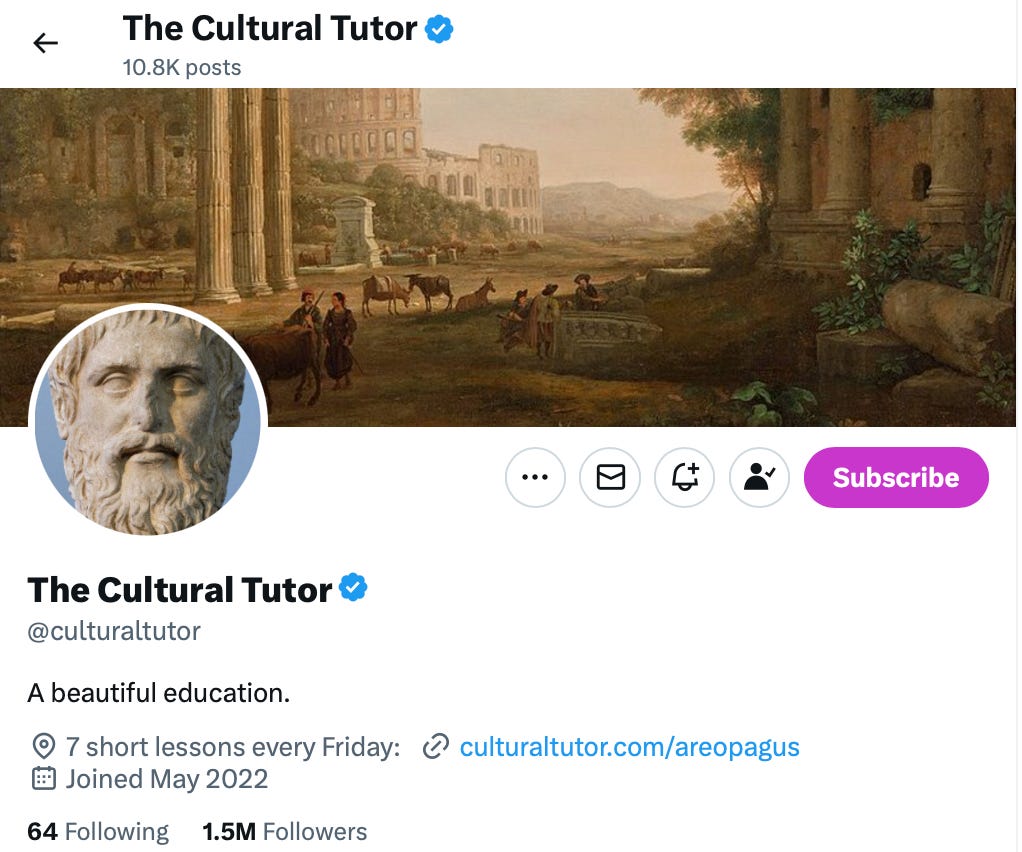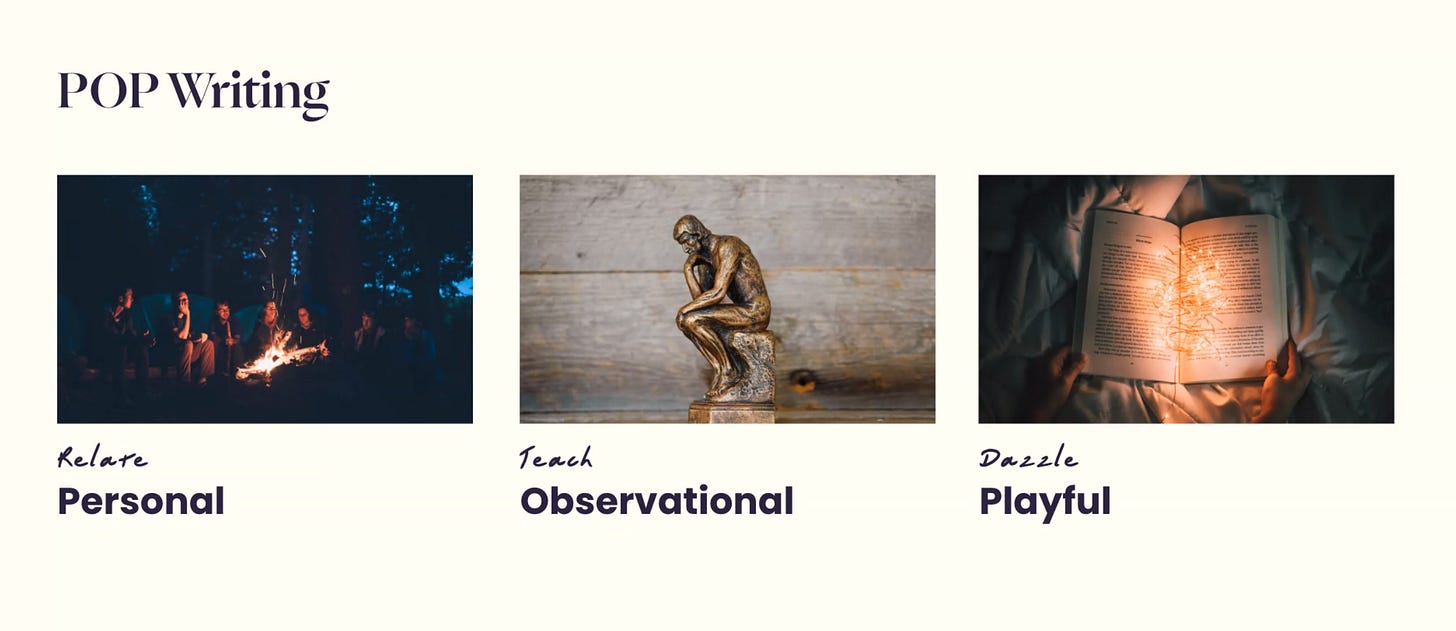Remember that feeling in school when a substitute teacher walked in?
Let’s go. Time to goof-off. But when I watched the guest lectures in Write of Passage, I rushed for my notebook. I grabbed a pen—not a pencil—to tattoo these insights on my hippocampi.
“Kids Don’t Have Sand Castle Block”
In a Deep Dive session on the craft of writing, Irish editor
taught us Hemingway’s secret to snapping writer’s block. If you can’t think of something, write one true sentence about anything.Remember Hemingway’s advice: “The first draft of anything is shit.” Do the same thing you’d do if you realized you ate a poisonous raspberry—get it all out.
When writing your first draft, don’t edit at the same time. Most of writing is mechanical rewriting and rethinking. Do that later.
Dylan’s best insight: when kids build sandcastles, they don’t get “sand castle” block. Why? Because they’re using their hands.
Experiment with making writing more manual.
Writing used to be like learning piano: a slow, deliberate hand dance. But then I discovered that legends like Neil Gaiman and Zach Bryan use pen and paper. So then I tried it out for first drafts. Unexpected ideas harmonized. Phrases sounded more personal.
For my piece, “Turn Off Your Notifications,” I wanted to write about how having all of your notifications turned on is silly. But everybody writes about this, using studies and other boring stuff. I needed an analogy.
Then, after ten minutes of staring at a Don Quixote painting in the coffee shop and writing down bullet-point ideas, I came up a banger of an analogy: the dog who never stops ringing the bell. It was relatable and funny. I wouldn’t have got this idea if I was poking away at my Macbook.
“You Are Your Audience”
Consistency and curiosity compound. In the last 18 months, The Cultural Tutor exploded to 1.5 million followers on Twitter. He’s posted a thread for over 550 days in a row.
But it wasn’t only consistency that led to his success. He followed his curiosity. It was the only way he could keep up his writing streak. And he doesn’t really have a “niche.” He writes about culture: painting, architecture, sculpture, classical music, and more.
Maybe curiosity is a better substitute for niche at the beginning:
“You are your audience.” - The Cultural Tutor
This year, I’ve been caught in the cult of “Money Twitter” where you run a business out of your Twitter account and it feels like you have to study sales and comment 100 times every day and learn offers and ENGAGE and plan 1,000 Tweets every month so you can feed that fat-fuckface algorithm little tidbits that’ll be lost in time.
But what about writing?
I’m not discounting marketing. Be your own audience, then share your stuff. The Cultural Tutor sent his threads to other accounts on Twitter after he made them. Being obsessed with Twitter engagement distracted me from what mattered the most: reading and writing.
Another takeaway: transform your inputs. If everybody reads the same books, everyone writes similar Tweets and thinks the same. Yep. On Money Twitter it felt like you were a loser if you didn’t read $100M Offers. [1]
To make distinct discoveries, the Cultural Tutor doesn’t consume any content younger than 50 years. His advice: don’t let what others are doing distract you from chasing your own curiosity. It has to excite you. Follow interests, not algorithms.
During the course, I paused my posts on Twitter. I started reading books and consuming longer-form content I was interested in, even if it wasn’t business-related. I also used this helpful heuristic from Paul Graham:
“If you were going to take a break from "serious" work to work on something just because it would be really interesting, what would you do? The answer is probably more important than it seems.” [2]
“Treat Your Audience Like a Genius”
POP Writing stands for Personal, Oberserational, and Playful. When you write with POP, your writing pops off. You develop a signature style that separates you from other writers and GPT.
In a POP Deep Dive session with pseudonymous writer
, she emphasized the importance of showing, not telling.Even that last sentence sucked. Let’s try again. With bold, italics, and full caps, Charlie recited her core writing tip like an Italian soprano: “SHOW DON’T TELL.”
To show, use specific sensory details. Say “King Soopers” instead of “grocery store.” These tiny things easily make an essay more powerful and personal. Be specific.
Another way to “show” is by turning cliches and dead language into analogies. “Go back to the scene and use your senses. What can I compare this to? What does this really remind me of?”
And if you end up on an emotion, go further: what action did it cause you to take? Instead of writing that I was depressed when I tore my ACL in 2021, I wrote: “the only source of a smile was watching Sopranos”.
It’s specific, sensory, and personal.
To be relatable as a writer, Charlie warned us about being critical of others. Tell a story, but avoid writing about how other people think, unless they told you. Treat your audience like they’re a genius. Let them come to their own conclusions.
22 One-Liners from Write of Passage
Write like you talk.
You are your audience.
Make your writing funny.
Get specific and personal.
Writing is mostly rewriting.
Respect the reader’s time.
Weekly publishing is sacred.
Kids don’t have sand castle block.
Use GPT daily as a tool to inspire you.
What would this look like if it were easy?
Treat your audience like they’re a genius.
Show the reader, don’t tell them how to feel.
Be a teenager: try on different writing styles.
GTFO clichés, dead language, and IKEA words.
Your essay will become more complex before simple.
Write music: change your sentence and paragraph lengths.
Always think about your writing as pairing stories and ideas.
Live like a comedian: pitch ideas to friends and write from conversation.
Make it your goal to get someone saying, “I’ve never met someone like you.”
Comedy sets are long: we still have the attention span, so make better content.
Do lay-ups with writing and publishing: what would this look life if it were easy?
built an audience of 12K without using social media (only Substack).Notes
[1] I’m not saying Hormozi is bad. I love him! He changed my life. His content shattered and remolded my belief systems. Even just learning that there’s tiny corner of the Internet where people make thousands of dollars online was really cool.
But Money Twitter was mimetic in its own way. Everyone was reading about sales and Hormozi, so you almost got FOMO if you didn’t. Tweeting about business skills is better to imitate than buying fancy Ferraris, but you still have to curate your curiosity.
“Don’t be the best, be the only.” - Kevin Kelly
[2] From Graham’s July 2023 essay, “How To Do Great Work”
If you read this far, you’re my type of person :)
To get my writing in your inbox the second it comes out, subscribe:
Thanks to
, , and Derek Wong for reading drafts of this.Tremendous Thanks to Charlie Bleeker, Dylan O’Sullivan, The Cultural Tutor, and the whole team at Write of Passage for the incredible online course experience (especially
, , and ).




Seconding Anthony’s comment -- this is such a great summary of key WoP concepts! Thanks for putting this together so succinctly. I’ll be revisiting this essay in the future.
Loved it, Baxter! Thanks for distilling these down.